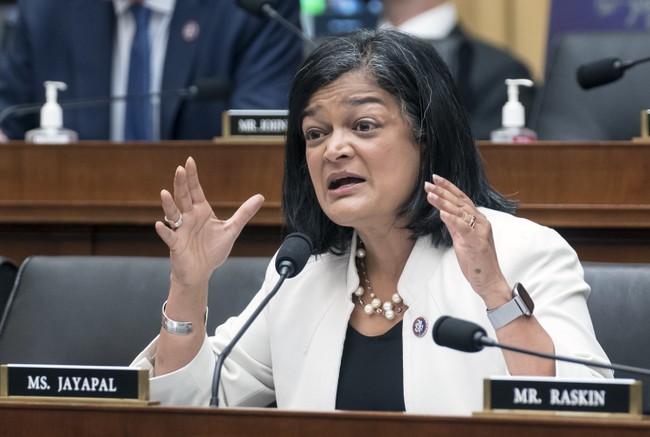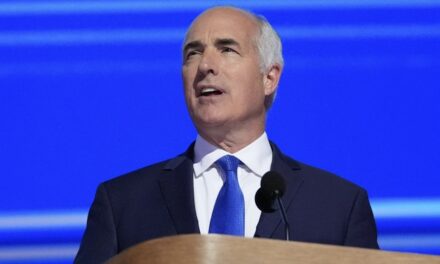We support our Publishers and Content Creators. You can view this story on their website by CLICKING HERE.

A somewhat surprising piece at Vox argues there is a clear answer to the debate now taking place among Democrats about what went wrong in this election. Whenever Democrats lose an election an argument breaks out between the two major factions of the party. Moderates argue that progressive extremism turned off swing voters. On the other hand, progressives argue that Democrats lose when they moderate so much that they fail to excite their base. In order to win, progressives say the party just needs to be more outspoken about left-wing policy solutions. Here’s that idea being voiced this week by Pramila Jayapal.
Advertisement
This year’s election results made one thing abundantly clear: Republicans, in general, vote for Republicans.
The true swing voter is our multiracial, multigenerational base that needs to see we’re fighting for them.
— Pramila Jayapal (@PramilaJayapal) November 17, 2024
She also made a specific claim about swing voters.
The true swing voters don’t swing between Republicans and Democrats.
They swing between the voting booth and back to the sidelines if they’re being ignored or taken for granted.
— Pramila Jayapal (@PramilaJayapal) November 18, 2024
In other words, Kamala Harris lost because uninspired Democrats stayed home, not because some voters switched parties and voted for Trump. That view has been given some support by one fact about the recent election.
Kamala Harris received far fewer votes than Joe Biden — and this decline in support for the Democratic nominee was larger than the increase in support for Donald Trump. As of this writing, Trump’s vote total in 2024 is 2.6 million higher than in 2020, while Harris has fallen more than 7 million ballots short of Biden’s vote total four years ago.
Does this prove that if Harris had just embraced all of her left wing positions from 2019, there would have been a blue wave of support to carry her into office? Author Eric Levitz says the answer is almost certainly no for a number of reasons. First, in the battleground states where Harris spent all of her time and money, her turnout didn’t collapse.
In the places that actually mattered, Harris did not earn dramatically fewer raw votes than Biden. To the contrary, in four swing states — Georgia, Nevada, North Carolina, and Wisconsin — she actually won more votes than Biden did in 2020.
Nevertheless, despite apparently mobilizing more Democratic voters in these states, Harris lost them all.
Advertisement
The idea that uninspired voters stayed home just isn’t true. Despite her efforts to moderate her former views, her voters did turn out when called upon. More to the point, there is evidence that Rep. Jayapal is wrong about swing voters. Millions of people do swing from one party to another between elections. If that weren’t true, Trump would never have won his first term.
According to an analysis of high-quality survey data from the University of Virginia’s Center for Politics, between 6.7 and 9.2 million Americans voted for Barack Obama in 2012 and then Trump in 2016.
There’s even some evidence this was happening again this year. People were switching in both directions but more people were switching from Biden to Trump than from Trump to Harris.
In the New York Times/Siena College’s final polls of the battleground states, 6 percent of Trump supporters said they’d backed Biden in 2020, while 4 percent of Harris voters said they had backed Trump.
One final point about non-voters. We don’t know how many non-voters might have voted for Harris if they had voted, but Levitz suggests there’s no reason to think those voters who chose not to vote are an especially progressive group.
In truth, Americans who want the Democratic Party to be more uniformly progressive are, by and large, the most reliably Democratic voters in the country. It is Democrats with more heterodox views — those who are progressive on some issues and moderate or conservative on others — that the party is most at risk of losing to either Republicans or the living room couch.
Advertisement
One way to think of this is to envision a continuum with Democrats on the left and Republicans on the right. There are some shifts from election to election but the people on the far left don’t usually move to the right enough to vote for the GOP and the people on the far right don’t usually move left enough to vote for the Dems.
But in the center is a fuzzy middle-ground that includes most of the people who aren’t voting in a given election. Think of it as a gap between red and blue, a DMZ made up of apathetic voters who don’t care enough to commit either way.
As the country moves to the right in response to issues like inflation, people left of center start to migrate through that apathy gap. Some make it across and vote for team red, but others get bogged down. Having abandoned plans to vote blue, they don’t quite get around to voting red either. They stay home.
Most of the non-voters are people like that near the center. So moving the entire party left (as progressives are now suggesting the party must do in response to Harris’ loss) won’t appeal to those voters in the middle. The reasons they are swing voters in the first place is that they aren’t committed to progressivism the way that Rep. Japayal is.
If anything, Harris’ previous commitments to some pretty far left views were a weak spot that team Trump capitalized on. Those ads with the tag line “Kamala is for they/them, President Trump is for you” are said to have moved people to the right by nearly 3 points. If Harris had leaned in to that instead of remaining silent on it, even more people on the center-left would likely have defected.
Advertisement
Levitz’ point in making this case is to save Democrats from making a big mistake in future elections by moving left in response to this election. I think he’s basically right, but I wonder if Democrats will be able to let go of some of the far left issues that got them in trouble this year: Open borders, trans athletes, workplace DEI, reparations, “Latinx”, etc. I’m not sure moderation is an option for many of these people. They like cancel culture and the power it gives them too much.

 Conservative
Conservative  Search
Search Trending
Trending Current News
Current News 







